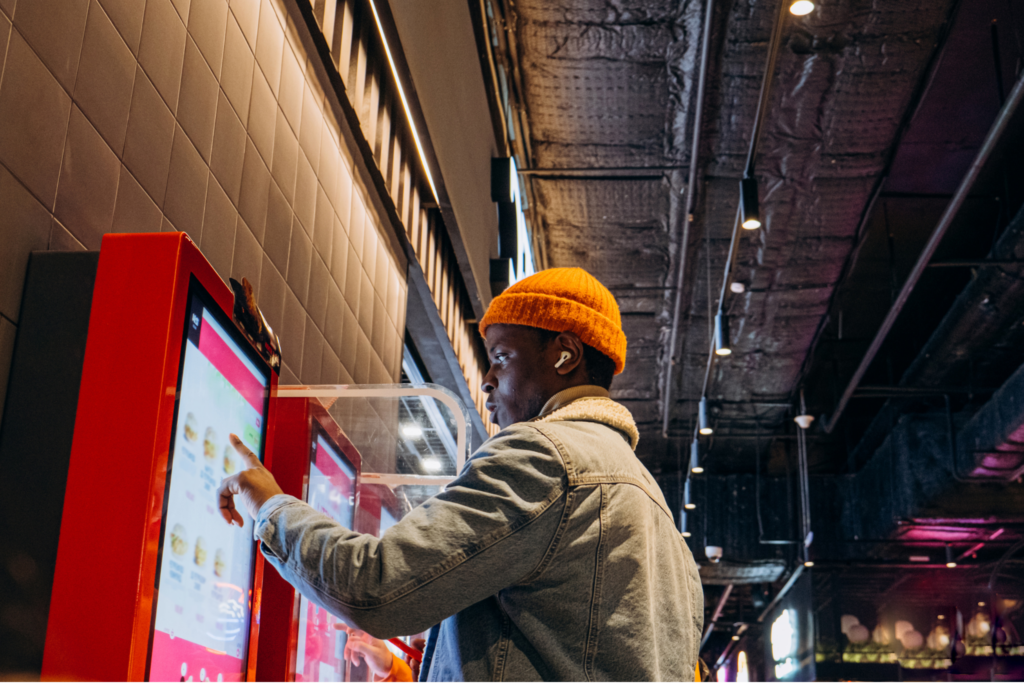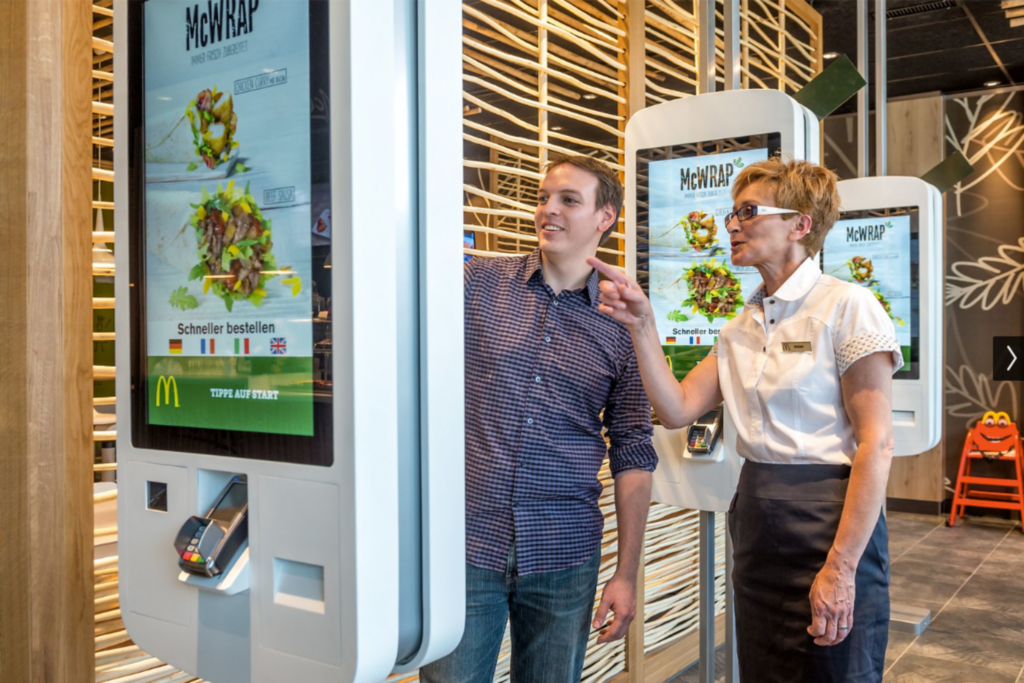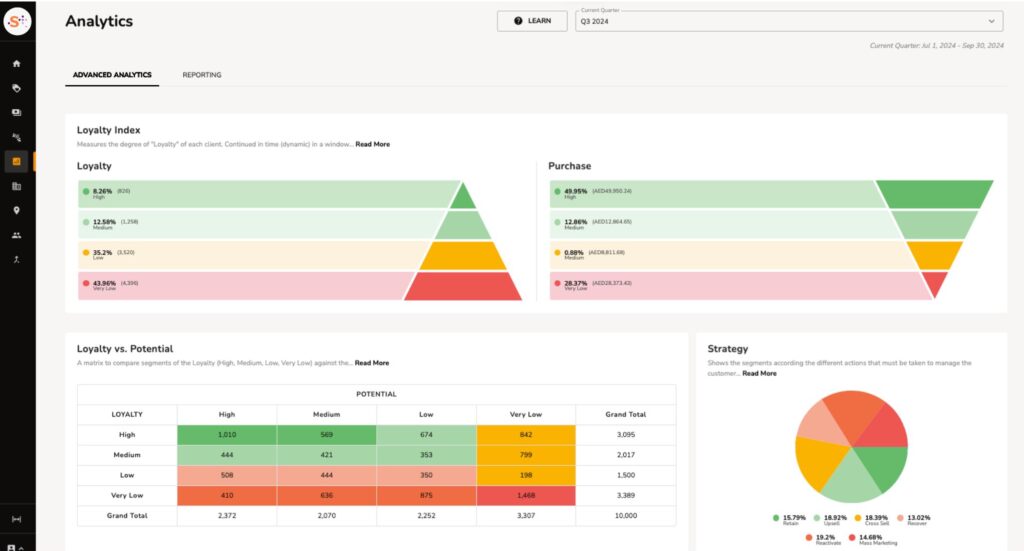The QSR industry is known for its fast-paced environment, where it prioritizes efficiency and customer satisfaction. In recent years, self-service kiosks have emerged as a transformative technology in the QSR industry, reshaping how customers interact with restaurants. These kiosks are not only enhancing operational efficiency but also redefining the customer experience. This blog post explores the relevance of self-service kiosks in the QSR industry and underscores the importance of integrating loyalty programs to maximize their potential.

Table of Contents
ToggleTransforming Customer Experience: Self-Service Kiosks in QSRs – A Game Changer
Self-service kiosks have revolutionized the way customers place orders in QSRs. These kiosks offer a host of benefits:
- Reduced Wait Times: Kiosks significantly reduce wait times, both for placing orders and for receiving them, by allowing customers to place their orders directly. This is particularly important during peak hours when long lines can deter potential customers.
- Increased Order Accuracy: Self-service kiosks minimize human errors in taking orders. Customers can review their orders before finalizing them, ensuring their meals are prepared exactly as they want.
- Enhanced Customization: Kiosks provide a visual and interactive way for customers to customize their meals. They can easily add or remove ingredients, see the changes in real-time, and explore new menu items without feeling rushed.
- Foster Omnichannel Loyalty: Customers who belong to the brand’s loyalty program can benefit from digital coupons or offers they receive via email or in-app, as kiosks allow customers to scan their promotional QR codes. This connects the digital experience to the ordering in the physical restaurant, enabling loyal customers to have a better omnichannel loyalty experience.
- Contactless Convenience: In the wake of the COVID-19 pandemic, self-service kiosks have gained additional relevance by offering a contactless way for customers to place their orders, aligning with increased health and safety concerns.
Achieving Operational Efficiency with Self-Service Kiosks in QSRs
For quick-service restaurant operators, self-service kiosks bring several operational advantages:
- Labour Optimization: By offloading the order-taking process to kiosks, staff can focus on food preparation and other critical tasks, improving overall efficiency. This can be particularly beneficial in times of labour shortages.
- Data Collection and Analysis: Kiosks collect valuable customer preferences and purchasing behaviour data. This data can be analyzed to refine menu offerings, optimize pricing strategies, and enhance marketing efforts.
- Consistency in Service: Kiosks provide a consistent ordering experience for all customers. This uniformity can lead to higher satisfaction levels and a more predictable workflow for the kitchen staff.
- Cost Savings: By reducing the need for front-of-house staff to manage orders, QSRs can achieve significant cost savings. These savings can be reinvested into other business areas, such as improving food quality or expanding marketing and loyalty efforts.
- Scalability: For QSR chains looking to expand, kiosks offer a scalable solution that can be easily implemented across multiple locations, ensuring a uniform customer experience.

The Role of Loyalty Programs in Self-Service Kiosks in QSRs
Integrating a loyalty platform with self-service kiosks can amplify customer and restaurant operators’ benefits. Here’s why loyalty programs are crucial:
- Customer Retention: Loyalty programs incentivize repeat visits by offering rewards, discounts, and exclusive offers. When integrated with kiosks, these programs become more accessible and easier to manage for customers.
- Personalized Experience: Kiosks can recognize returning customers through their loyalty accounts, offering personalized suggestions based on past orders and preferences. This tailored experience enhances customer satisfaction and fosters brand loyalty.
- Increased Engagement: Gamified loyalty programs can be integrated with kiosks to engage customers in fun and interactive ways. For example, customers can earn points for every purchase and redeem them directly at the kiosk, creating a seamless and rewarding experience.
- Enhanced Customer Insights: Loyalty programs linked with kiosk transactions provide deeper insights into customer behaviour. This customer data can be used to refine loyalty marketing strategies, develop targeted promotions, and create a more personalized dining experience.
- Seamless Integration: Modern kiosks can seamlessly integrate POS systems with rewards programs with loyalty mobile apps and online platforms, ensuring customers have a consistent experience regardless of how they interact with the restaurant. This omnichannel approach strengthens customer relationships and enhances brand loyalty.
Future Trends and Considerations
As self-service kiosks continue to evolve, several trends and considerations are emerging that QSR operators should keep in mind:
- Artificial Intelligence and Machine Learning: Incorporating AI and machine learning into kiosks can further enhance personalization and efficiency. AI can predict customer preferences and suggest items based on time of day, weather, and past behaviours.
- Voice Recognition Technology: The integration of voice recognition technology can make kiosks even more user-friendly, allowing customers to place orders verbally, which can be particularly beneficial for those with disabilities or those who prefer a hands-free experience.
- Sustainability Initiatives: Kiosks can support sustainability initiatives by encouraging customers to make eco-friendly choices, such as opting for plant-based menu items or using digital receipts instead of printed ones.
- Augmented Reality (AR): AR can provide an immersive experience, allowing customers to visualize their meals before ordering. This can enhance engagement and help customers make more informed decisions.
- Enhanced Security Measures: As kiosks handle sensitive payment information, ensuring robust security measures is crucial. Implementing advanced encryption and fraud detection technologies will protect customer data and build trust.
Embracing the Future of QSR with Self-Service Kiosks and Loyalty Programs
Self-service kiosks are no longer a novelty but a standard feature in the QSR industry. Their ability to streamline operations, enhance customer satisfaction, and provide valuable data insights makes them an indispensable tool for modern restaurants. By integrating loyalty programs and staying ahead of emerging trends, QSR operators can maximize the potential of self-service kiosks, ensuring a competitive edge in an increasingly dynamic market. As technology continues to evolve, those who adapt and innovate will lead the way in shaping the future of the QSR industry.
Did you find value in this information? If so, please share it with your colleagues in the industry to help them stay informed and ahead of the curve. The QSR industry is known for its fast-paced environment, where it prioritizes efficiency and customer satisfaction.







